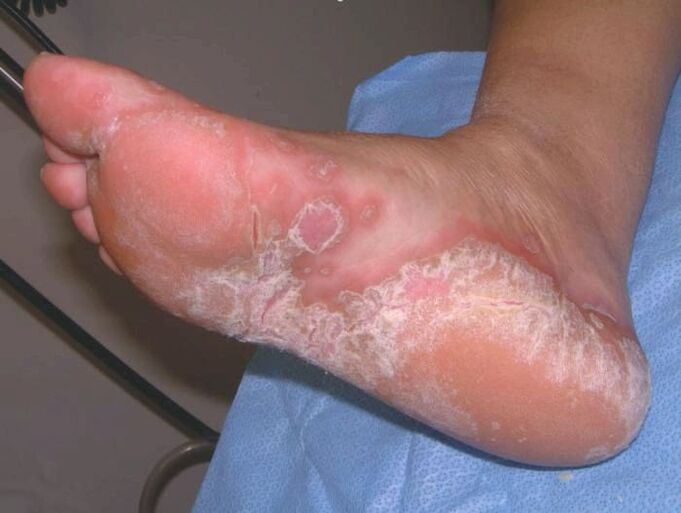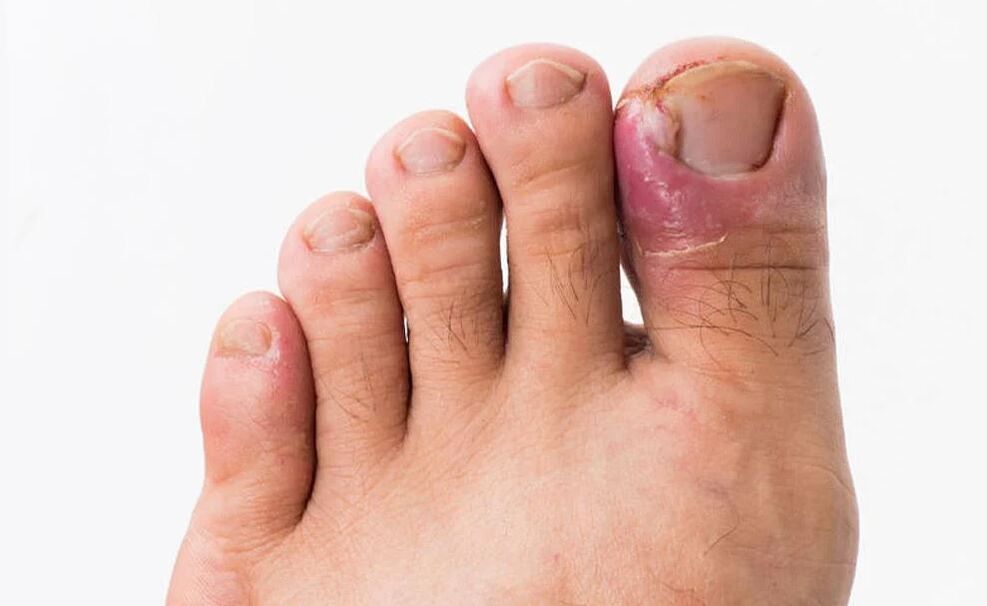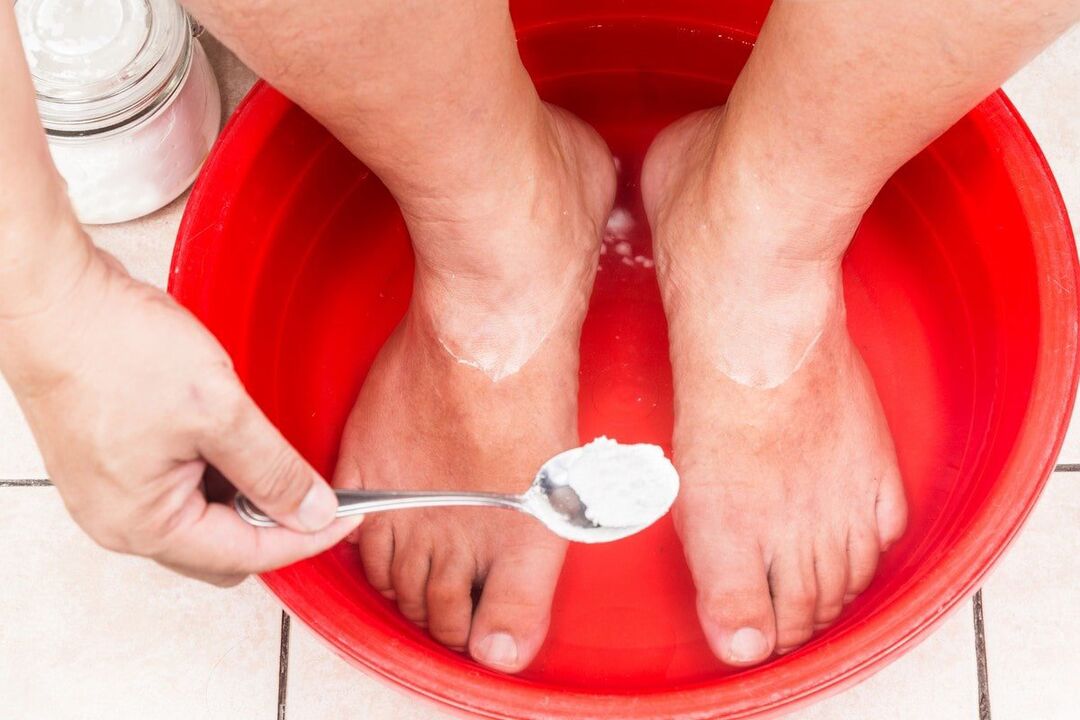Hello dear readers. The manifestation of the fungus is quite common, bringing considerable discomfort to the wearers. The problem must be solved. And how to do it - you will find out now. Let's look at how to treat foot fungus at home with folk remedies. Remember, it's better to prevent foot fungus than to treat it later. You should not self-diagnose and self-medicate, be sure to consult a doctor at the slightest suspicion of foot fungus.
Foot fungus: what it is
Foot fungus is an infectious fungal lesion that localizes to the skin (mycosis) and nails (onychomycosis) and then spreads to other parts of the body and includes many varieties. Pathogenic organisms affecting the integument are divided into the following types: yeast, mold and dermatophytes.
It is quite simple to get infected with a foot fungus - it is enough to come into contact with a surface inhabited by pathogenic fungi.

Above all they inhabit the interdigital space. These can be floors in public places, another person's shoes, personal hygiene items, and infection through untreated pedicure tools during the procedure is also possible.
A significant problem is not only the ease of infection, but also the extraordinary reproduction rate of microorganisms.
There are also factors that increase the risk of the disease:
- constantly wearing closed shoes, which is more typical for males;
- an environment with a temperature favorable for the survival of fungi and a high level of humidity;
- violation of blood circulation in the lower extremities;
- weakened work of the immune system, which does not allow to provide protection to the body;
- regular visits to public places without preventive hygiene measures;
- in the high-risk group - people with thin skin;
- increased sweating, which promotes the reproduction of mushrooms;
- hereditary predisposition;
- advanced age of the potential carrier;
- diseases of the cardiovascular system, venous insufficiency;
- diabetes;
- flat feet;
- uncontrolled medication intake;
- being overweight;
- avitaminosis.
The initial symptom of a fungal infection is the formation of epidermal scales on the feet, through which further infection occurs, as well as severe itching. Other symptoms and their severity depend on the type of fungal pathogen and the degree of damage to the epidermis and its derivatives.
Trichophyton interdigitale
With this type of injury, peeling is often accompanied by the formation of fluid, an inflammatory process is present.
The fungus spreads over the entire surface of the foot, including the sole, hips, arch and toes, but it is also possible to develop allergic reactions on the skin in areas of the trunk, face, upper and lower limbs. . Occasionally, damage to the nail area is observed.
Candida mushrooms
In a disease associated with a fungus of the genus Candida, the skin is hyperemic (overflowing with blood) and edematous, the area of infection is surrounded by exfoliated skin. In the peripheral region, vesicles with serous and purulent contents are formed.
Trichophyton red
The pathology is manifested by the infection of the interdigital folds, while the fungi first multiply in the narrowest interdigital folds.

Unlike the previous types of fungal microorganisms, it causes multiple damage to the nails.
The danger is also expressed by the fact that the fungus can multiply in large skin folds (inguinal, buttocks, and so on).
However, the symptomatology depends not only on the type, but also on the clinical form of the pathology, of which there are several!
Form canceled
Manifestations: slight peeling between the fingers, the cracks are small and do not bother.
scaly form
Manifestations: desquamation also extends to the lateral surface of the feet, accompanied by itching, due to the thickening of the horny layer of the integument of the feet, luster is noted.
Hyperkeratotic form
Manifestations: the formation of rashes in the form of dry papules and plaques, there is moderate itching, a white shade of scaly layers.
Intertriginous form
Manifestations: after redness and swelling, maceration, burning and itching develops, a clear severity of diaper rash.
Dyshidrotic form
Manifestations: the formation of many blisters with thickened membranes, hyperemia and edema develop, reminiscent of acute eczema.
To avoid infection with a fungal parasite, you need to take preventative measures that help protect yourself.
- Keep your feet moderately dry and cool to prevent microorganisms from multiplying.
- It is advisable to wash the feet several times a day with warm water, always with soap, and after washing, dry the feet over the entire surface, paying particular attention to the space between the toes.
- In public places, you should use your own personal shoe change and at least sometimes go barefoot indoors so that the skin can breathe.
- For wearing, use extremely comfortable, easily ventilated and practical shoes, preferably made of natural materials.
- It is also necessary to change socks and socks as often as possible if there is a problem of excessive sweating.
- The presence of bad habits and irrational nutrition significantly reduces the resistance of immunity to various types of injuries, therefore, it is necessary to eliminate bad habits and improve nutrition.
How to treat foot fungus with folk remedies
There are many commonly recognized means of fighting fungal infections of the feet.
Sodium bicarbonate
Sodium bicarbonate based antifungal agent. To prepare it, you will need to make a 1: 1 porridge-like mixture of baking soda and water, which should then be applied to the affected areas for 15 minutes. After using soda, it is recommended to wash the skin and use the powder.

Garlic
Garlic is an effective remedy even in an advanced stage of the disease. You can rub the shells with garlic cut in half or use a mixture of butter and garlic.
Coffee
Baths based on strong natural coffee are used only before bedtime. They soften the skin and make it more tender.
Vinegar
It is difficult to overestimate the benefits of any type of vinegar in this situation: the usual 9%, wine or apple. Prepare a solution in a ratio of 1: 8, but before lowering the legs, they should be steamed and the nails cleaned.

It is recommended to carry out the procedure 5-7 times a day for faster cure of the disease. You can also dissolve the egg in a glass of vinegar and, after mixing it with a teaspoon of butter, apply as an ointment to the affected areas.
celandine
Tinctures based on celandine are also relevant in use both in the form of baths, and in the form of compresses and ointments.
Calendula
You can lubricate damaged feet with tincture of medicinal calendula flowers. In this case, the infusion should dry itself, it should not be canceled.
How to treat foot fungus - medicines and drugs
Remember that all medications should be taken only after consulting a doctor and also only after the doctor has made a diagnosis that will confirm the presence of foot fungus.
How to treat foot fungus in a baby and during pregnancy
With fungal lesions of the feet in children, the appearance of bubbles is observed, which are then converted into erosion and first appear in the interdigital folds. Listen to the baby: he may start complaining of burning and discomfort.
If you turn to folk remedies, then a decoction of wormwood, salt baths, infusion of lilac, compresses of rowan leaves will help.
During pregnancy, many drugs are prohibited, but there is still a list of those that will help a woman in position, sulfur salicylic tar ointment.
However, this does not mean that these drugs can definitely be used, as allergic reactions are possible. This should only be done after a doctor's recommendation.


























